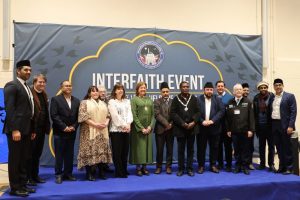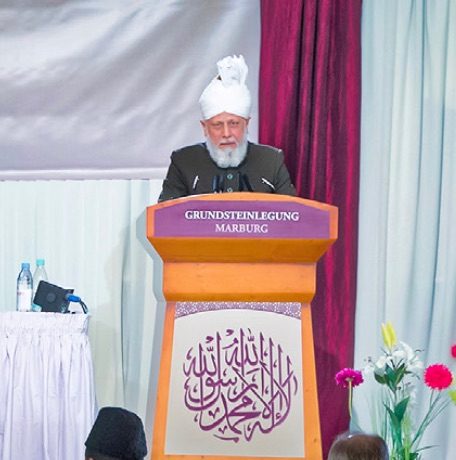
Fareed Ahmad, London, UK
The Review of Religions spoke with Fareed Ahmad, who is the National Foreign Affairs Secretary of the Ahmadiyya Muslim Association UK, about the background of this high-profile event and the impact it has had.
The first question is, can you give a little background into what this event is and what is its significance?
So, this is the International Ministerial Conference on ‘Freedom of Religion or Belief’ and it was held on the 5th and 6th July at the Queen Elizabeth II Centre in London. It’s a rotating conference, in the sense that the chair of the conference rotates through different countries and it’s organised by various governments. Last year it was hosted by the US government and this year it’s been hosted by the UK government as chair of the Ministerial Conference, with Lord Ahmad as the lead minister. It’s quite recent as an event, although governments have been working for a long time on freedom of religion or belief, this has been a way to bring together the international community, in particular policy makers and lawmakers from different countries as well as NGOs and civil society and really try to spotlight the issue of freedom of religion at an international level. There was a precursor that was held in the US which was called the IRF Summit. In the Ministerial Conference we had about 800 delegates from approximately 100 countries and ministers from about 27 countries. This is the largest international conference hosted by the UK government this year so that sort of reflects the seriousness by which it was taken by the UK government and the resources they put into it.
Another way of measuring its significance is that it was supported by, as I mentioned, ministers but also had messages of support by various high-level dignitaries, the Prime Minister, Prince Charles and so on, as well as international dignitaries including of course His Holiness’ (aba) special message for the conference. So that is the background to the event and the objective is really to raise the issue of freedom of religion, to try and discuss ideas on how it impacts people and where things can be done differently, what space is there for government to act and change things for the better with regards to freedom of religion and belief, across all beliefs and all faiths without distinction.

How did it get to the point where His Holiness (aba) decided to send a video message as well for this event?
By the grace of Allah, we worked with the Foreign Office, who hosted the event as the lead department and they set up a conference advisory committee and I had the opportunity to serve on that as well. The committee’s role was to advise the Foreign Office on how we thought this conference should run and give our thoughts and views. As part of that, one of the things that came up was that it would be really valuable to have people from different faith groups sending messages to this, or speaking at the event – to reflect the different faith communities in the UK and worldwide and given that the focus is especially on those communities that are persecuted. The ideas were therefore put into discussion in that forum and submitted for approval by ministers. By the grace of Allah, the idea that was put in was approved, for different faith leaders to be speaking. The request was then submitted to His Holiness (aba) through the National President of the Ahmadiyya Muslim Community UK, and His Holiness (aba) graciously approved and agreed with that request. To have the messages or speakers from dignitaries would have the greatest impact if you have them at the main session that was the best attended and that was the opening session on the first day, on the morning of the 5th. So, the messages – either in person or via video were generally for about thee minutes. The message of His Holiness (aba), was about five minutes long and by the grace of Allah, it has an excellent impact.
How were the messages from His Holiness (aba) and others received by the attendees?
I know from my own interactions with delegates, that His Holiness’ (aba) message was really well received and there were two messages from Muslims – one was from Sheikh Muhammad Al-Issa, Secretary General of the Muslim World League from Saudi Arabia, and the other was from His Holiness (aba). From the interaction I had, they said His Holiness’ (aba) message far more powerful and far more representative of Islam. That’s the feedback I had from Muslims, not just from non-Muslims at the conference.
Can you explain the wider participation of the Ahmadiyya Muslim Community UK in this event?
Over the course of the two days, there were a lot of side events that were held and the UK Jama’at participated in 12 events. We also hosted about five events ourselves on different topics; one was about prisoners of conscience, one was about the persecution of Ahmadis in Pakistan, one was about digital persecution through cyber laws and there was another one on persecution in Algeria. I also spoke as part of the main conference on how persecution impacts on everyone, in a session called ‘Leaving No One Behind’. All these had extremely good external on the panels – including ministers, former Secretaries of State, party leaders, faith leaders, diplomats and key NGO representatives – and the events were well attended. One of the side-events we hosted was in parliament and we screened a documentary on the persecution of Ahmadi Muslims called ‘Section 298’, which is a new documentary filmed and produced externally in Pakistan last year and this was the first major screening.
Which other faiths were represented in the event?
There was a wide cross-section of faith groups at the event. What was also nice was that there were a lot of people that we have engaged with over the years, old friends, new friends and across different communities – and various denominations of Muslims, Christians, the Hindus, the Jews – so [it was] a really cross-faith event and it allowed us to make some really good new contacts in this field as well. Of course we don’t just stop here but can now work together to take the work forward.

Could you give us a sense of what to expect going forward? What are the next steps, now that people are familiar with His Holiness’ (aba) message?
It was an excellent international platform on which His Holiness’ (aba) message was delivered, alongside the likes of the Archbishop of Canterbury, the Chief Rabbi, Prince Charles, the Prime Minister and so on, so there was a very high level of representation at the conference. What it meant was that maybe for many people who attended the event, it was the first time they would have heard His Holiness (aba) speak directly, in his own words. It has an immense impact. It’s very different to read or hear about things but when you see someone in front of you, it creates its own impression. His Holiness’ (aba) message would have certainly been relayed back to the 100 countries that attended the event and also it was broadcast live globally online as part of the conferences’ proceedings. I think this will have increased the awareness of what the Ahmadiyya Muslim Jama’at (Community) stands for, not just that we are persecuted, but of our focus on peace and compassion and cross-faith understanding and respect as well. All of that and the fact that we have a global leader who talks about these matters with wisdom and, despite the fact that we are being persecuted, we respond with prayers. In his message, His Holiness (aba) specifically said that the requirement or obligation for Muslims is to defend other places of worship (of other faith communities). I think, all of these messages, coming directly from His Holiness (aba) himself, has a far greater impact than we can imagine and I think that’s what will help set the scene for future work and future engagement, Insha’Allah [God willing].




Add Comment